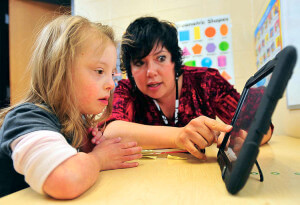 Working in special education is one of the most rewarding options a person can choose for their profession. People who work in this field often report that their work, while difficult and trying at times, is intensely gratifying. Also, special education professionals tend to share a bond formed through the sharing of a common goal and the difficulties they face on a daily basis.
Working in special education is one of the most rewarding options a person can choose for their profession. People who work in this field often report that their work, while difficult and trying at times, is intensely gratifying. Also, special education professionals tend to share a bond formed through the sharing of a common goal and the difficulties they face on a daily basis.
Because of these aspects of the job, many aspiring educators choose to pursue special education work as their job focus. The outlook for special education professionals is good, and there are a variety of paths that an aspiring educator can take to begin their career. While some people elect to pursue certification and begin as a teacher, many people opt to become a para-professional first. These are skilled assistants that fill a variety of capacities in the special education classroom. The method for becoming a para-professional differs based on a person’s initial education.
High School Diploma
Most school districts require that their para-professionals have at least two years of college credit or that they pass a proficiency test. The best way to find out which regulation applies in an area is to simply contact a local school district’s human resources department, or the regional office of education. People in either office will be able to give correct information regarding local regulations for para-professionals.
Depending on personal situation, a good avenue for people without any schooling past high school is to investigate training programs at local community colleges and local universities. There are quite a few programs designed to train people for work with infants, adolescents and students with disabilities. Any of these programs would serve an aspiring para-professional well, and would likely translate to credit in future teacher certification work. Also, many states require para-professionals to pass a certification test, and this coursework would serve as preparation.
Bachelor’s Degree in an Unrelated Field
For people who have a bachelor’s degree in any field other than education, the first step is to contact local school districts and the regional office of education. Most districts require minimal coursework, if any, to begin working as a para-professional. However, these agencies can also point fledgling educators in the right direction for local training programs and seminars that can increase the chances for successful work in an educational capacity. Also, since the para-professional certification test is a requirement, this coursework is a good idea.
Bachelor’s Degree in Education
For people who have created education coursework, all that remains is to pass the para-professional certification test. However, it is still a good idea to contact local districts, since they often have methods to help employees reach certification status. There are also non-certified positions available, such as general education classroom assistants, that can serve as a bridge to special education para-professional work. While the para-professional certification test is most likely required, education coursework should be sufficient for preparation.
Special education para-professionals enjoy a satisfying career with ample opportunity for advancement. The work is rewarding, the hours are family-friendly and educators can truly make a difference in the lives of students.



